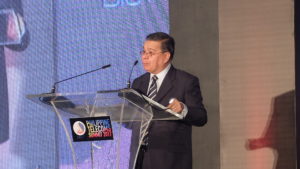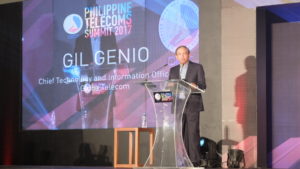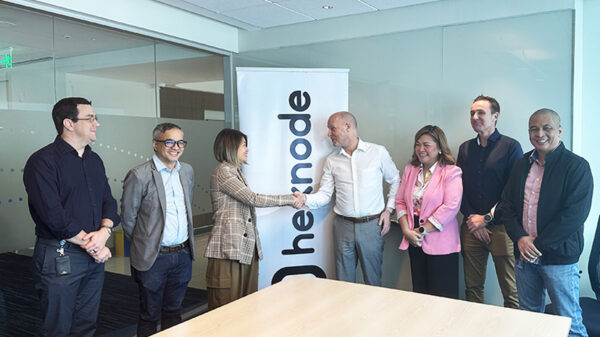Today, with mobile apps, social media, video-based communications, and cloud computing being the norm, a slow internet connection can easily drive a person crazy, especially in the Philippines.
While telecommunications services have improved, based on tests conducted by the National Telecommunications Commission, the Philippines has the world’s second slowest mobile data connection speeds.

Department of Information and Communications Technology Secretary Rodolfo A. Salalima. PHOTO BY MELBA BERNAD
“There have been improvements in the quality of service of the telcos but because of the increasing demand for wireless broadband access, there is a need for more cell sites,” said Cordoba in his presentation at the 1st Philippine Telecoms Summit held on March 9 to 10.
But the progress is still not enough to lift the Philippines in world rankings. According to a new study by OpenSignal, the Philippines’ overall mobile data connection speed is only 3.33Mbps, the second slowest in the world. South Korea topped the overall speed table, delivering a typical mobile data download connection of 37.5Mbps.
While the Philippines ranks poorly in mobile connection speed, it has the cheapest mobile surfing cost in Asia, with only 0.10 U.S. cents per megabyte or Php5 per megabyte of data volume, according to data from UBS Group AG. After all, you get what you pay for.
The National Broadband PlanHowever, with the National Broadband Plan gaining approval from President Rodrigo Duterte, will Filipinos finally experience fast internet speed?
“The National Broadband Plan will provide improved public access to telecommunications services,” said Department of Information and Communications Technology Secretary Rodolfo A. Salalima in his keynote speech at the telecoms summit. “It is the platform and enabler of the state’s e-government plan for the government to have one digitized network for its online services for the country’s citizens, business and government, and a centralized common data base.”
Salalima went on to say that the NBP is the enabler of the portal service project mandated by the President in his first State of the Nation Address last year, and in relation to which the government’s Wi-Fi project (also mandated in SONA 2016) will be an important component.
The NBP, Salalima adds, is the country’s contribution to the ASEAN Masterplan 2016, which aims to make ICT the engine of growth in the region and to make the region a globe ICT hub.
“The National Broadband Plan is the realization of every man’s and every Filipino’s right to public service under the 1948 Universal Declaration of human Rights (Section 21) and the 2012 Resolution of the U.N. Council on Human Rights which declared that the right to communicate is a basic human right,” said Salalima.
Speaking at the summit, DICT Undersecretary Denis F. Villorente told delegates that the NBP will focus on four outcomes: accelerated investment on infrastructure; mobilized and engaged public and private sectors; more places connected; and increased internet usage.To get more places connected, Villorente noted the importance of optimizing spectrum use and leveraging the use of satellite and emerging technologies, particularly in geographically-challenged areas.
In presenting the timeline for the NBP, Villorente said a feasibility study and the start of potential RFP process is scheduled for the second quarter of 2017. By the first quarter of 2018, the government aims to sign a contract with the selected supplier.
Regulatory hurdles
Telecommunications companies, particularly Globe Telecom and PLDT, have for years been verbally attacked by many consumers and even companies for their “snail-paced” internet services. In turn telcos have blamed local government units and red tape for hindering them from improving their services.

Gil Genio, Chief Technology and Information Officer and Chief Strategy Officer, Globe Telecom. PHOTO BY MELBA BERNAD
At the telecoms summit, Genio said that it takes 8 months to get a permit from an LGU for the installation of a cell tower. “We need to fix the national embarrassment of having only about 16.3K towers versus Vietnam’s 70K,” Genio told summit delegates.
In his presentation at the summit, Joachim Horn, Chief Technology and Information Advisor at PLDT and Smart, also pointed to the challenges in network rollout as the culprits behind slow internet, weak or no signal, and dropped calls.
Tackling the issue on permits, Salalima said that it should only take seven days to process licenses and permits for putting up infostructure and infrastructure necessary for telecommunications. Two more days may be given for the local chief executive to decide whether to approve or deny a permit, but if after that, no decision has been made, the permit should be deemed approved.
Secretary Salalima is confident that if this recommendation of his is followed, the Philippines will be looking at improvements on the telecoms services just after six months.“Solutions with no deadlines are no solutions at all,” Salalima emphasized during his keynote speech.
Spectrum issues
The telcos have also blamed the current spectrum allocation for slow internet connection speeds. To address this concern, Salalima ordered the NTC to publish in the February 12, 2017 issue of Philippine Star (issue of February 12, 2017), all the mobile frequencies assigned, unassigned and still available, assigned but unsused, assigned but with spectrum user’s fee unpaid.
Salalima has also ordered the NTC to start all quasi-judicial proceedings for the recovery and return of those frequencies unused and with frequencies unpaid to our government for re- assignment to legitimate telcos who will and must use these frequencies for public service.
“Rights, in this case, mere privileges granted to telcos, if abused, cannot supplant the overriding public good, and the police power of the State and the swift exercise thereof. But due process will be punctiliously observed.
“The frequencies are owned by and belong to the State as ‘national patrimony.’ Enough of frequency hoarding or warehousing for purely financial speculative gains. Radio frequencies must be assigned solely and only for public use. No use, no payment of SUF? Then the State takes these frequencies back and fast,” stressed Salalima.
Recommendations from telcos
At the summit, both Genio and Horn listed their recommendations to the government to improve the state of telecommunications in Philippines
Among Genio’s recommendations are the amendments of the Local Government Code and the Republic Act 7925: An Act to Promote and Govern the Development of Philippine Telecommunications and the Delivery of Public Telecommunications Services. Genio also called for an update in the Philippine ICT Roadmap.
“Above all, sites, sites, sites,” said Genio.
For his part, Horn urges the government to standardize permit fees and shorten application processing time. He also suggests the allocation of space for telecoms infrastructure in public highways. Horn also calls on LGUs and communities to help safeguard broadband facilities. Telcos should also be given equal access to buildings and gated communities, he said.
Low penalty for erring telcos
While telcos blame regulations for their poor services, the National Telecommunications Commission has revealed that current laws do not deter telcos from violating laws.
NTC’s Cordoba says the penalty for erring telcos is only Php200 per day of violation based on a 1936 law and, thus, does not deter telcos from violating laws. According to NEDA, the value of Php200 today is Php1.76 million.
Sec. 21 of Commonwealth Act 146, as amended (Public Service Act, 1936) provides “Every public service violating or failing to comply with the terms and conditions of any certificate or any orders, decisions, or regulations of the Commission shall be subject to a fine of not exceeding two hundred pesos per day for every day during which such default or violation continues; and the Commission is hereby authorized and empowered to impose such fine after due notice and hearing.”
To address this concern, Cordoba says that Senator Bam Aquino has filed a bill increasing the fine to a minimum of Php 300,000.00 to a maximum of Php 5,000,000.00 for every day, per violation, during which such default or violation continues. Congressman Victor A. Yap has also filed a similar bill.
Other challenges faced by the NTC and the telecommunications industry include resistance from subdivisions, villages, and condominiums on the installation of cell sites in their premises due to health concerns.
Now that the government has laid out its strategy for improving telecommunications services, we can only hope that the plan will not be derailed and that fast internet connection speeds, at a reasonable price, will be experienced by Filipinos very soon or in six months as envisioned by Salalima.





















































































































